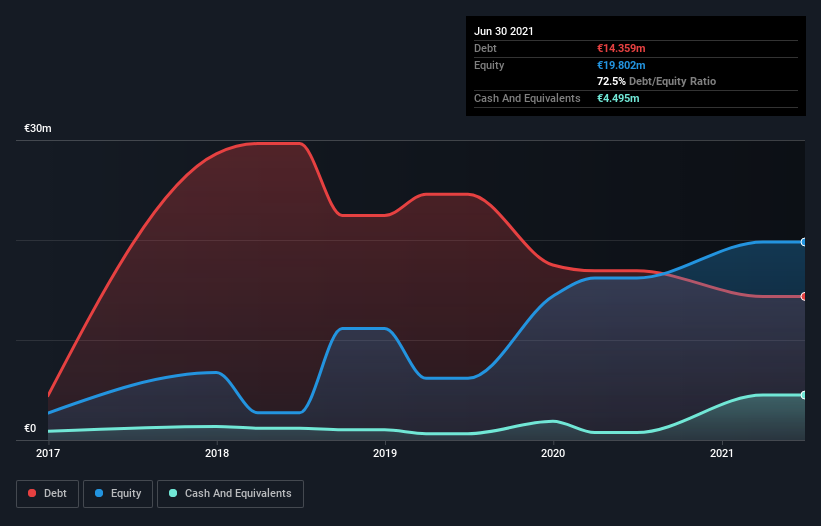- France
- /
- Interactive Media and Services
- /
- ENXTPA:ALWIN
Here's Why AudioValley (EPA:ALAVY) Can Afford Some Debt
David Iben put it well when he said, 'Volatility is not a risk we care about. What we care about is avoiding the permanent loss of capital.' It's only natural to consider a company's balance sheet when you examine how risky it is, since debt is often involved when a business collapses. We can see that AudioValley SA (EPA:ALAVY) does use debt in its business. But is this debt a concern to shareholders?
What Risk Does Debt Bring?
Generally speaking, debt only becomes a real problem when a company can't easily pay it off, either by raising capital or with its own cash flow. In the worst case scenario, a company can go bankrupt if it cannot pay its creditors. However, a more common (but still painful) scenario is that it has to raise new equity capital at a low price, thus permanently diluting shareholders. Having said that, the most common situation is where a company manages its debt reasonably well - and to its own advantage. When we examine debt levels, we first consider both cash and debt levels, together.
See our latest analysis for AudioValley
What Is AudioValley's Debt?
The image below, which you can click on for greater detail, shows that AudioValley had debt of €14.4m at the end of June 2021, a reduction from €16.9m over a year. However, it also had €4.50m in cash, and so its net debt is €9.86m.

A Look At AudioValley's Liabilities
According to the last reported balance sheet, AudioValley had liabilities of €17.9m due within 12 months, and liabilities of €13.5m due beyond 12 months. Offsetting these obligations, it had cash of €4.50m as well as receivables valued at €9.78m due within 12 months. So its liabilities outweigh the sum of its cash and (near-term) receivables by €17.1m.
This deficit isn't so bad because AudioValley is worth €39.8m, and thus could probably raise enough capital to shore up its balance sheet, if the need arose. But it's clear that we should definitely closely examine whether it can manage its debt without dilution. When analysing debt levels, the balance sheet is the obvious place to start. But ultimately the future profitability of the business will decide if AudioValley can strengthen its balance sheet over time. So if you're focused on the future you can check out this free report showing analyst profit forecasts.
In the last year AudioValley wasn't profitable at an EBIT level, but managed to grow its revenue by 11%, to €23m. We usually like to see faster growth from unprofitable companies, but each to their own.
Caveat Emptor
Over the last twelve months AudioValley produced an earnings before interest and tax (EBIT) loss. To be specific the EBIT loss came in at €3.3m. Considering that alongside the liabilities mentioned above does not give us much confidence that company should be using so much debt. So we think its balance sheet is a little strained, though not beyond repair. For example, we would not want to see a repeat of last year's loss of €4.8m. So we do think this stock is quite risky. The balance sheet is clearly the area to focus on when you are analysing debt. However, not all investment risk resides within the balance sheet - far from it. Case in point: We've spotted 4 warning signs for AudioValley you should be aware of.
If, after all that, you're more interested in a fast growing company with a rock-solid balance sheet, then check out our list of net cash growth stocks without delay.
Valuation is complex, but we're here to simplify it.
Discover if Winamp Group might be undervalued or overvalued with our detailed analysis, featuring fair value estimates, potential risks, dividends, insider trades, and its financial condition.
Access Free AnalysisHave feedback on this article? Concerned about the content? Get in touch with us directly. Alternatively, email editorial-team (at) simplywallst.com.
This article by Simply Wall St is general in nature. We provide commentary based on historical data and analyst forecasts only using an unbiased methodology and our articles are not intended to be financial advice. It does not constitute a recommendation to buy or sell any stock, and does not take account of your objectives, or your financial situation. We aim to bring you long-term focused analysis driven by fundamental data. Note that our analysis may not factor in the latest price-sensitive company announcements or qualitative material. Simply Wall St has no position in any stocks mentioned.
About ENXTPA:ALWIN
Medium-low risk with imperfect balance sheet.
Market Insights
Community Narratives




